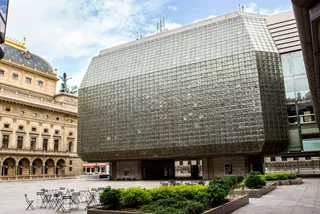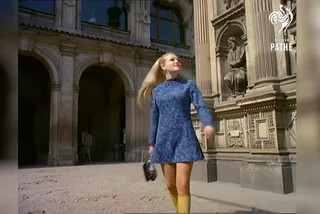Radio Free Europe started full-time broadcasts in the Czech language 70 years ago on May 1, 1951, and it lasted for half a century, even beyond the end of the Cold War.
During the communist era, the Czech version of RFE, called Rádio Svobodna Evropa, was one of the few objective sources of information for the people of then-Czechoslovakia. At that time the U.S.-funded broadcaster was based in Munich in what was West Germany.
Czech president Václav Havel praised the service on its 50th anniversary in 2001.
“All through the long years of communism, it provided the only avenue for the free exchange of information, for free journalism, and also the only, or rather, the main, source for communication between the opposition at home with the public, the general society, and the nation. I believe that our society owes Radio Free Europe immense gratitude for the role it has played in the past," Havel said.
At an event in 2011 to mark the 60th anniversary, then-Czech prime minister Petr Nečas praised the service. “RFE tore down the information barrier erected by the communist regime. The truth and RFE will always stay in our conscience,” he said. The Slovak prime minister at the time, Iveta Radičová, sai the broadcasts “brought a small island of freedom to people's homes.”
The first shortwave broadcast in the Czech language actually took place July 4, 1950, from an office in the Empire State Building in New York City, but it didn’t operate on a regular schedule until the station moved to West Germany a few months later. Broadcasts began with the phrase, “Volá hlas svobodného Československa, rozhlasová stanice Svobodná Evropa” (The voice of Free Czechoslovakia is calling, the radio station Free Europe).
The new location, close to the border of Czechoslovakia, allowed RFE not only to broadcast but also to send helium-filled weather balloons with packets of news stories across the border, a practice with took place between 1953 and ’56. Czechoslovak authorities also made efforts to jam the broadcasts. Czech people caught spreading news from RFE faced possible imprisonment or the loss of their jobs, while their children lost educational opportunities.
The birth of RFE’s Czechoslovak section was helped by a number of important personalities of the post-February 1948 emigration, such as the writers Ferdinand Peroutka and Pavel Tigrid. After 1968, important names from Prague Spring became involved: Karel Jezdinský, Sláva Volný, and Martin Štěpánek. Eventually, poet and lyricist Jan Schneider and singer Karel Kryl found their way there.
The project was not without incident. A bomb made of plastic explosives went off at the Munich headquarters on Feb. 21, 1981, outside the section that housed the Czechoslovak Broadcast Service severely wounded three broadcasters. The bomb was reportedly placed by the Romanian secret service, but the operative placed the device by the wrong door.
In another incident, between 1972 and ’76 the Czechoslovak service was infiltrated by a communist agent named Captain Pavel Minarik, who sought information on RFE’s informants. He was hailed as a hero on his return to Czechoslovakia, and became the subject of the song “Statečný chlapík.”
There was also an unsuccessful attempt by the Czechoslovak Secret Service (StB) in 1959 to poison the salt shakers in the RFE cafeteria.
Until 1972, RFE was covertly received funding from the U.S. Central Intelligence Agency. It has been independent of the CIA since then. Radio Free Europe merged with its sister broadcaster Radio Liberty in 1976 to become RFE/RL.
Broadcasting continued after 1989, but funding was reduced. Starting in 1994, broadcasts were done in cooperation with Czech Radio, which contributed two-thirds of the funding. At that time, the new service called RSE made over 40 hours of political and educational programs weekly, which were broadcast from the Czech Radio building. The Czech service completely stopped Sept. 30, 2002. Service in the Slovak language lasted a little longer, until Jan. 31, 2004.
The closure was due to a shift in priorities after the terrorist attacks in the U.S. on Sept.11, 2001.
“It was an extremely difficult decision because Rádio Svobodna Evropa has been a most important component of RFE/RL since it was founded more than half a century ago, but we have new priorities and new financial burdens we have to carry in our budget that did not exist before Sept. 11," Thomas A. Dine, president of Radio Free Europe/Radio Liberty, said in 2002 when the closure was announced.
He added that Radio Free Europe/Radio Liberty ended broadcasting to Hungary in 1993 and to Poland in 1997.

RFE/RL, though, still has a presence in Prague, despite not broadcasting to the local audience. The station’s European base moved from Munich to Prague at the start of 1995, and was located in the former Czechoslovak Federal Assembly building, between the national Museum and State Opera. After 9/11, the street in front of the building had to be closed off, and an armored vehicle was stationed there.
RFE/RL moved to a newly built a more secure location in Hagibor in Prague 10 on May 2009.












 Reading time: 4 minutes
Reading time: 4 minutes 





























